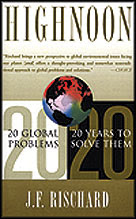You hear it over and over again. Learning must be relevant to kids' lives. I completely agree. But sometimes I feel too little credit is given to the power of how we -- as teachers -- can make something non-local relevant to kids.
At a workshop I recently attended my table was supposed to be coming up with sample research paper assignment questions which would force kids to go beyond the basic instruction to "Write about a disease." We proposed a series of increasing challenging questions, from "what is disease? what diseases do I know?" to "what are the most deadly diseases in the world for which we don't have a cure?" to "if I had to write Bill Gates and convince him to give money [or raise money myself] for research into one deadly disease, what would it be and why?". The workshop leader was gently trying to get us to come up with questions more based in the kids' everyday reality, e.g., what diseases are in my community and what I can do about it?
But what if malaria isn't rampant in our community? Does that mean we shouldn't encourage kids to learn about it?
As Rischard said at some point in his talk, we must get people into the mindset of the question,
Which makes me think of Kieran Egan, one of my favorite educational theorists. In an article back in 2003 in the Phi Delta Kappan, he asked if we should, "Start with What the Student Knows or with What the Student Can Imagine?"
While starting with what the child knows works with some subjects, e.g., material ones, it shouldn't be a rigid rule. He bemoans the limitation of the social studies curriculum which annually expands from the family to the community to the state to the country to the world. It can take forever to get to that world perspective. Perhaps that's where we should be starting...
Technorati Tags: EARCOS07, global issues, questions, international, teaching
At a workshop I recently attended my table was supposed to be coming up with sample research paper assignment questions which would force kids to go beyond the basic instruction to "Write about a disease." We proposed a series of increasing challenging questions, from "what is disease? what diseases do I know?" to "what are the most deadly diseases in the world for which we don't have a cure?" to "if I had to write Bill Gates and convince him to give money [or raise money myself] for research into one deadly disease, what would it be and why?". The workshop leader was gently trying to get us to come up with questions more based in the kids' everyday reality, e.g., what diseases are in my community and what I can do about it?
But what if malaria isn't rampant in our community? Does that mean we shouldn't encourage kids to learn about it?
As Rischard said at some point in his talk, we must get people into the mindset of the question,
How can I be first a global citizen, second a national citizen, and third a local citizen?
Which makes me think of Kieran Egan, one of my favorite educational theorists. In an article back in 2003 in the Phi Delta Kappan, he asked if we should, "Start with What the Student Knows or with What the Student Can Imagine?"
While starting with what the child knows works with some subjects, e.g., material ones, it shouldn't be a rigid rule. He bemoans the limitation of the social studies curriculum which annually expands from the family to the community to the state to the country to the world. It can take forever to get to that world perspective. Perhaps that's where we should be starting...
Technorati Tags: EARCOS07, global issues, questions, international, teaching


